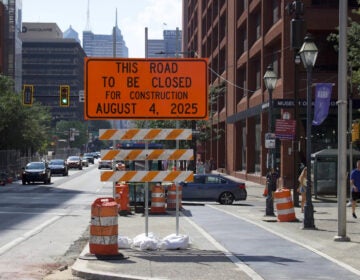Is it time for the sun to set on waterfront development gamesmanship?

Members of a group that advocates for the Central Delaware riverfront say developers have too often received zoning variances for projects that never materialize, starting a spiral that depresses waterfront development.
Sometimes, they said, it seems developers have sought variances without ever intending to build.
The variances allow the developers to make significant profit by selling the land without developing it, explained member Joe Schiavo, because the ability to build higher or denser makes the land more valuable than it was under the base zoning.
“The approvals stay with the parcel, not the owner,” Schiavo said. “They are 100 percent transferable.”
“What we feel really is that there should be some legislation that says there’s a time limit,” said Member Richard Wolk. If a project doesn’t get built within that time limit, the zoning would expire, he said. An alternative would be a restriction on the zoning relief so that it applies only to the developer and the project at hand, he said.
“I think this is a practical proposal so that we can break this cycle of parcels failing to be developed again and again along the Central Delaware, or anywhere else in the city,” Schiavo said. “I think that these approvals are actually a detriment to development, because they are adding value to the land, and making the land more valuable to be sold rather than built.”
The Central Delaware Advocacy Group’s Thursday discussion was spurred by PlanPhilly reporter Jared Brey’s recent story on the status of proposed riverfront projects that remain unbuilt, many of which received zoning approvals.
After reading it, “I sort of sat back and started wondering, ‘What are we doing here?’” Wolk said.
Schiavo – and others on and off CDAG – have talked about this issue for some time. Schiavo said what he’s seen over the years is that this phenomenon doesn’t stop with one developer making money on the land without building. “Sometimes the special approvals are granted, and the developer sells the land. The new owner paid more than the original owner, so to make the numbers work, he needs further special approvals. And the city often grants the additional bonuses,” which are also transferable.
“From one perspective, this is a ponzi scheme,” he said. “Someone is going to be left holding a parcel of land that they’ve paid so much for, that it is really not practically developable, in this economy in this city. That’s what happens. Projects go bust. Land doesn’t get developed.”
Member Jim Moss said this is similar to what happened with the New Market site in Society Hill – it transferred hands without projects being built, until finally an owner went bankrupt. That parcel is now being developed by Toll Brothers.
Moss, who is an attorney, questioned the city’s ability to tie granted variances to the requesting party or project at hand only. He noted land use rights are a state issue.
It seemed to him a sunset provision would be easier to do, and also very effective. “It would be a huge incentive” for developers to build projects before they lost the ability to, he said.
Schiavo said it was worth talking to the city law department, planning, and local officials about the problem and potential solutions. There just might be a way to tie variances to a particular owner or project he said. “As you’re aware, there are zoning overlays and other conditions applied to areas of the city or particular parcels, and all of that is legal,” he said. “We just need to see what latitude we might have here.”
CDAG Member Marsha Bacal said she knows there’s no way all the on-the-books approvals will ever result in projects, but that doesn’t mean they don’t worry her. “If one-fifth of what what is out there actually happened, we’d have a demolished riverfront,” she said.
Wolk and others agreed, noting that many of the variances granted would allow for projects that don’t fit with the Master Plan for the Central Delaware or the zoning overlay that gives it teeth.
Schiavo, who ran the meeting in Chairman Matt Ruben’s absence, said this was just the beginning of CDAG’s discussions – many board members were absent, and more input was needed. But he hoped that CDAG would eventually have a concrete proposal of a way or ways to remedy the situation.
Schiavo said he would discuss the issue with First District Councilman Mark Squilla on Friday.
WHYY is your source for fact-based, in-depth journalism and information. As a nonprofit organization, we rely on financial support from readers like you. Please give today.






